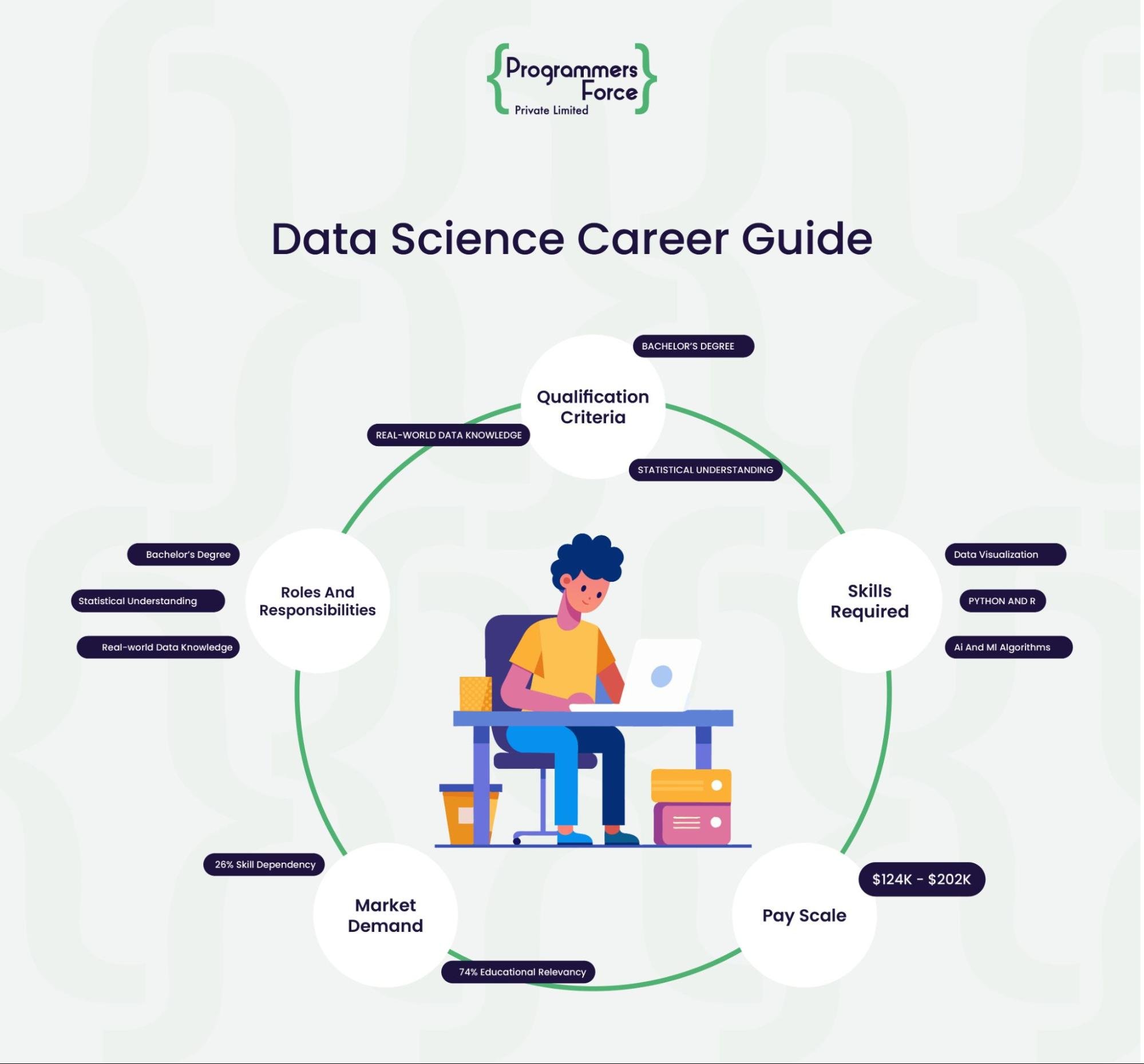
Data Science and Jobs – How to Build a Successful Career Path
Are you aware that data science is still the job of the year and that using data insights can improve business revenue upto $25.94 billion by 2026?
Imagine, in the hectic tech world of Northern California, a marketing executive encountered a dilemma where his firm had an abundance of client data but lacked the insights that drive effective campaigns. However, following the data science trends, he discovered that blending the statistical data, computer science, and domain technicalities can reveal hidden patterns and help the company to grow. Let’s explore the concept, significance, and lucrative career path the data science domain is offering to industrial experts and businesses.
What is Data Science? Idea and Job Demand
Data is everywhere and in everything you do. In most cases, the valuable information is hidden in raw form, making it challenging for people to understand. Data science is the combination of mathematical, statistical, and domain knowledge elements that help businesses extract insights and make predictive decisions. The involvement of data science helps businesses solve problems and enhance their operational efficiencies by assisting them in decoding the data.
“Without big data analytics, companies are blind and deaf, wandering out onto the web like deer on a freeway” – Geoffery Moore
With millions of job openings in big data and related domains, data science has become one of the most requisite positions in the tech world. Industrial experts say about 17,700 job openings have been recorded in this domain every year over a decade. Explore an exclusive guide, points and alternative career paths in the next sections.
The Data Science Career Guide Outlook

With data science being called one of the most demanding careers of the 21st century, this domain has become appealing regardless of the complexity of its degree. It also serves as the most searched job in 2024. Here is an outlook for the data science solutions training guide and requirements to pursue this field.
Qualification Criteria
Candidates who aim to pursue data science careers should have a bachelor’s degree in computer science, IT, or STEM(science, technology, engineering, and mathematics). They are required to have basic knowledge of mathematics and statistical concepts with a passion for working with real-world data and exploring valuable insights.
Required Skills
The skill set for the data science field may vary, from generalized proficiencies of data visualization expertise, which is 10.2%, to technical abilities of utilizing AI tools and a strong grip on the programming language. As of 2023, 78% of jobs require Python as a basic skill. Moreover, data scientists are required to be familiar with AI and ML algorithms and have a basic understanding of data architecture.
Salary Ranges
A recent analysis of the data scientist’s salary range found that the estimated total pay for the role is $156,991 annually. However, the income band for data science lies between $124k and $202k; remember that the salary can vary based on the years of experience candidates have.
Market Demand
In one of the recent research, it is observed that 20% of employers seek data scientists with bachelor’s degrees while 30% with master’s and 24% with PhD. However, the rest, 26% of recruiters, don’t specify the requirements and indicate that candidates with non-formal backgrounds can also stand a chance to appear in the interview depending upon their skill set and strong portfolio.
Roles and Responsibilities
Data scientists are responsible for mining and extracting data from valuable structures. They also use machine learning tools to optimize classifiers. Moreover, data scientists execute the preprocessing of structured and unstructured data while cleaning and validating its integrity. One key responsibility of a data scientist includes business and team collaboration to achieve the desired outcomes.
How Can Data Scientists Maximize Their Salary Scales?
The evolving domain of data science requires continuous exploration and adaptation. However, high competition exists between candidates who aim to choose this domain, which may compromise applicants’ salary scales. Give a minute read to these points and explore how you can maximize your pay scale while negotiating well.
| Enhance Expertise | Explore new technologies and gain experience beyond Python, as a good pay scale requires expertise in SQL or Tableau/PowerBI and much more. |
| Demonstrate Management Skill | Convince you can work collaboratively with teams and are good at open communications. Explain how well you can manage work and personal life. |
| Improve Industry Knowledge | Explore industries like finance, e-commerce, etc, and switch niche to gain experience in different industries. |
| Level up Position | Once you gain industrial experience, search for a higher position while proving your skills. Study well and prepare for interviews before appearing. |
| Convince Well | Your power of convincing can lead you to good positions. Negotiate well and demonstrate your ideas that can help the businesses improve ROI. |
How is a Data Scientist Different from a Data Analyst
Data scientists mainly focus on developing algorithms and predictive models, while data analysts collect, classify, and analyze raw information to help businesses with tailored solutions. Listed below are some of the key fundamentals that explain the dissimilarities between the two:
| Data Scientist | Data Analyst |
| Data scientists work toward innovative ways to collect, store, and manipulate data sets. | Data analysts make sense from the existing data sets with their routine analysis and report writing |
| Data scientists are responsible for developing new approaches to ask and answer business questions. | They work towards answering business queries and rely on database software. |
| Data science employment is anticipated to grow upto 35% by 2032, which is much faster than the average rate in other roles. | The market of data analysts is expected to grow on a similar scale; however, it is predicted that the world can produce upto 463 exabytes of data every day by 2025 |
Alternative Career Paths for Data Science Jobs
In the 21st century, building a successful career is the aim of every fresh mind; however, due to high competition and demand, not all candidates can get a chance to pursue their field in data science. Therefore, numerous jobs are still available for those who understand the technicalities of raw data sets and information. Let’s explore more options in this domain that are as beneficial as data science.
Machine Learning Engineer
ML engineering is one of the alternative careers; candidates can opt for it instead of data science. There has been a debate that the two roles may possess similar responsibilities. However, machine learning engineers tend to focus on the more technical aspects of projects, such as the structure and design extracted from the provided data.
Business Consultant
Candidates can also choose business consultation as their career pathway in order to assist the firms with specific problem identification that serves as a hurdle to reaching business objectives. Business consultants determine appropriate approaches that help companies to overcome their challenges.
Data Product Manager
Data product management is also one of the domains that rely completely on data for the development of the products. Also, the lead is responsible for converting raw data into useful information. They strategize and collaborate with stakeholders to create a clear roadmap to prioritize the features based on business values and client feedback.
Data Engineer
Another option for an alternative career path includes data engineering, which enables industrial experts to prepare and organize the data sets stored in the company’s database. Data engineers build systems that collect, manage, and convert the raw data into meaningful information. However, their ultimate goal is to make the data accessible to the business owners for their understanding and performance optimization.
Will AI Replace Data Science Career | What Does the Future Hold for This Domain?
Following the big tech layoffs after the pandemic in 2023, it was observed that the job cuts exceeded 150,000 in 2022 and continued for a year. However, from LinkedIn’s analysis, 1157 people posted their drop-off stories. This strongly impacts many fresh graduates and other industry professionals, as a question arises regarding AI replacing data science jobs. Despite artificial intelligence being the most evolving technology, the future outlook of data science careers looks promising. Some of the key factors include:
- Data scientists can update their skills with AI and machine learning in order to enhance their workflow.
- AI will help automate the structure, reducing the workload that ultimately helps data scientists make strong strategic decisions.
- With AI integration, data consultants can improve their ability to tackle intricate problems.
In conclusion, the rise of AI is not a threat but an opportunity to explore more modern technologies and developments, focusing on business queries while bridging the gap between challenges and company goals.
Build Your Career as a Data Scientist with Programmer Force
Are you someone who is looking forward to an automated world of data science? A domain that can be lucrative and promising, offering diverse opportunities to explore and adapt. Programmer Force provides comprehensive training with real-world practical projects and case studies to learn while using the latest data-driven technologies. We at PF are building careers for several data scientists, be they entry-level or senior; candidates can get a chance to transform their careers with market-competitive salaries. Visit our website to learn more and enroll now!
Here is one of our data scientists sharing her experience!
“Joining Programmers Force as a Tech Support Engineer trainee was a significant milestone in my career, especially as the first and only female in a male-dominated team. Initially, I faced many challenges, but my passion for analyzing and troubleshooting issues helped me excel in my role. However, after some time, I felt my learning had plateaued. Recognizing my skills, they transitioned me to the Data Science team, allowing me to flourish as a Tech Data Analyst. This role has given me the freedom to leverage my abilities fully and produce the best outcomes. I am especially thankful to my Team Lead, Sir Frayyam, for his support and for providing me with the autonomy to excel in an open environment. His efforts have been instrumental in shaping me into an all-rounder.
I extend my heartfelt thanks to Programmers Force for this incredible opportunity and for fostering an environment where I can grow and thrive professionally.” – Noor ul Ain.










